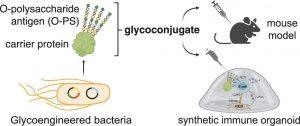Animal testing is nearly always necessary for the development and testing of novel medications or vaccinations for people, but this testing can often take years and raise ethical questions about how the animals are treated. In a recent study, scientists created a brand-new testing platform that comprises B cells into tiny organoids with the aim to speed up vaccination screening and significantly lower the requirement for animals (Figure 1).
By exposing the immune system to an antigen—which might be all or a portion of a virus or bacterium—vaccines help the body be ready for a potential exposure. A polysaccharide coat on some bacteria necessitates the use of specialised conjugate vaccines, such as those that guard against pneumonia and meningitis. It is unclear exactly how conjugate vaccines interact with B cells to trigger an immune response.
Historically, vaccinations have been tested by injecting them into animals and then waiting weeks or months for the results. Researchers are investigating the use of organoids, which are tiny clusters of cells that behave like miniature organs and create a simulated environment that mimics in vivo circumstances, in order to expedite the procedure and solve ethical concerns.
In this work, B cells from mouse spleens were separated, cellular signalling molecules and structural components were added, and everything was then enclosed in a synthetic hydrogel matrix to create organoids. They then created conjugate vaccination candidates that were directed at the particular bacteria.
The group discovered that the platform may be used to find B cell clones that produce highly antigen-specific antibodies, which have several potential uses. More work has to be done because this project is still in its early stages.
Journal article: Tyler D. Moeller, T.D., et al., 2023. Profiling Germinal Center-like B Cell Responses to Conjugate Vaccines Using Synthetic Immune Organoids. ACS Central Science.
Summary by Stefan Botha











